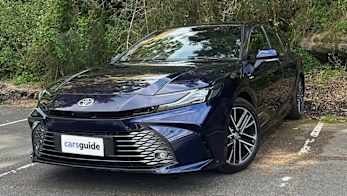Porsche has joined a growing list of automakers in watering down their electric vehicle sales ambitions due to a lack of consumer demand.
The company expects its EV transition to take longer than first projected, having previously stated its goal was to have an 80 per cent EV line-up by 2030.
In a statement to Reuters, Porsche said that the figure could only be achieved as long as consumer demand and technological advancements in the electromobility sector allowed for it.
"The transition to electric cars is taking longer than we thought five years ago," Porsche said in a statement.
"Our product strategy is set up such that we could deliver over 80 per cent of our vehicles as all electric in 2030 - dependent on customer demand and the development of electromobility."
While EV uptake has skyrocketed in the Chinese market, propelling marquee brand BYD to Tesla's top EV challenger, it has become relatively stagnant in the European market due to a tapering of government subsidies for new buyers.
In Australia, EV purchases remain a relatively small portion of new-vehicle sales, accounting for roughly eight per cent of new-car sales in the first six months of this year.
Demand in the US also remains relatively low, leading executives from a growing list of carmakers such as Ford, Genesis, Audi, Mercedes-Benz and Kia to either wind back or call for more regulatory flexibility in their ambitions to go electric.
.jpg)
In 2023, European Union lawmakers approved a ban on the sale of all petrol and diesel cars by 2035.
Audi’s CEO, Gernot Döllner, recently told Autocar that the carmaker would instead expand its hybrid range in each of its core model segments, while remaining committed to its goal of a fully electric range by 2033.
“Within the Volkswagen Group, we recognised early on that plug-in hybrids were a relevant project technology and now we see that the bridge is longer than we initially thought,” he said.
In anticipation of a hybrid push, Audi has engineered a new range of more fuel-efficient combustion engines that will work alongside their PHEV technology, allowing their hybrid models to travel 100km solely on battery power.
It’s a move that appears to be out of the Toyota playbook, with the Japanese automaker historically an outlier in its reticence to overcommit to a fully electric future – a move it has been heavily criticised for.
.jpg)
Greenpeace ranked Toyota last in its evaluation of the world’s largest automakers' efforts to phase out combustion engines.
Though it’s a gamble that appears to be paying off, at least financially.
Australian consumers are adopting hybrid vehicles in record numbers, with Toyota leading the pack by a considerable margin.
In the first six months of 2024, hybrid sales in Australia increased by 125.5 per cent, while PHEV sales increased by 106.3 per cent.
Toyota’s sales increased by 31.5 per cent over that same period.





.jpg)

.jpg)

.jpg)

.jpg)
.jpg)

.jpg)
.jpg)


.jpg)

_0.jpg)

.jpg)

.jpg)




.jpg)